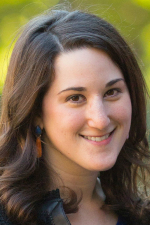Human beings’ urge to express themselves is so strong that it can be leveraged to increase charitable donations.
That’s the finding of one of the newest faculty members at the Henry W. Bloch School of Management.
Jacqueline Rifkin, Ph.D., came on board this semester as an assistant professor of marketing. She is co-lead author of a paper recently published by the prestigious Journal of Marketing.

For one of the experiments the authors conducted, they placed tip jars on a café counter, alternating for set periods between a single jar marked “Tips” and a pair of two jars, with one labeled “Cats” and the other “Dogs.” The result: When café guests were able to vote for their favorite animal by choosing between two jars, the total dollar amount of tips doubled.
In a similar experiment soliciting donations to the American Red Cross in which half of people could choose to donate by expressing their preferred ice cream flavor, donors gave 28% more money when given the opportunity to express an opinion at the same time.
Since the paper was published earlier this summer, it has generated international news coverage, including an article in the German magazine Der Spiegel.
The research was inspired by anecdotal accounts offered by baristas and other counter-service retail workers.
“Put really simply, people are willing to pay for a chance to share what they believe in, and this is what makes the dueling preferences approach so effective at increasing giving.”
“Our goal in this research was to formally test the belief that this strategy works, and, moreover, to understand the psychological reason why it works,” Rifkin said. “We found that this strategy works because it transforms an act of giving into an opportunity to say something about one’s beliefs and opinions, which people inherently find motivating.
“Prior work has shown that people find the act of self-expression to be incredibly attractive and rewarding. In fact, the parts of the brain that light up when we get to share our opinions also light up in response to finding $10 or eating dessert,” Rifkin added. “Put really simply, people are willing to pay for a chance to share what they believe in, and this is what makes the dueling preferences approach so effective at increasing giving.”
Rifkin’s co-authors are Katherine Du, assistant professor of marketing at the Lubar School of Business, University of Wisconsin-Milwaukee; and Jonah Berger, associate professor of marketing at The Wharton School, University of Pennsylvania.
Rifkin earned her Ph.D. in business administration at Duke University and her Bachelor of Arts in psychology at the University of Pennsylvania.

